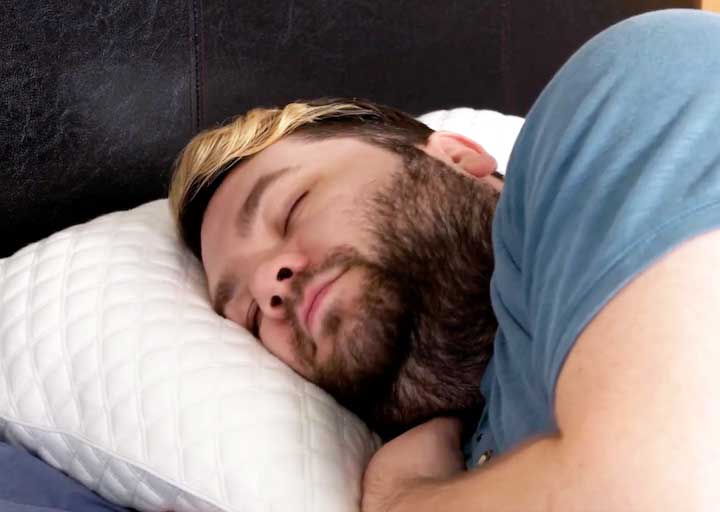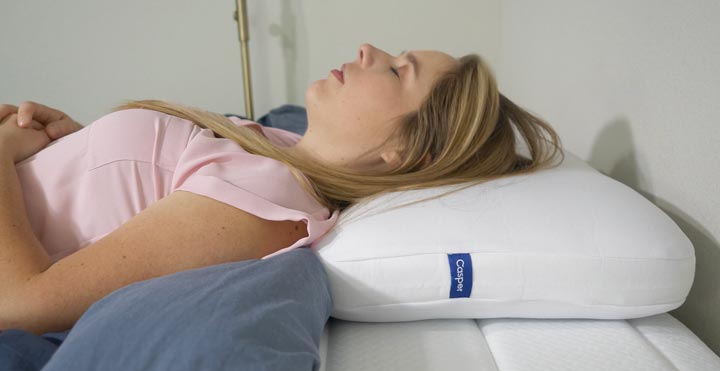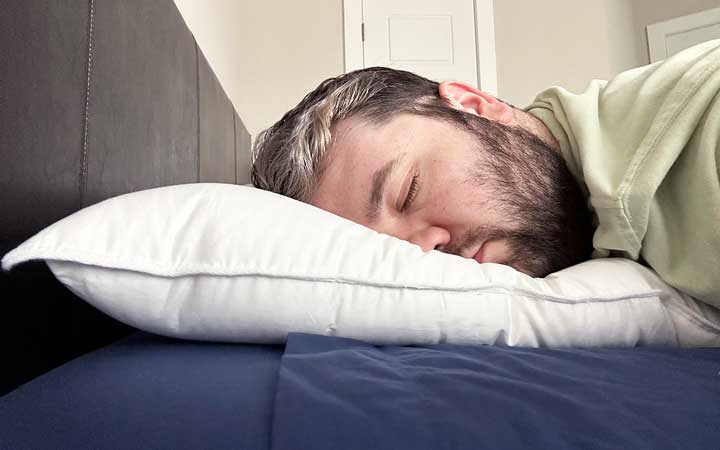Waking up with neck pain can be debilitating. We all know the feeling of “sleeping wrong” and waking up with a painful crick in your neck.
A sore neck every once in a while may not be a cause for alarm, but waking up day after day with neck pain can dramatically impact your quality of life and productivity. If you are one of the 10-20% of adults who experience some form of neck pain from sleeping, you may want to figure out what’s going wrong so that you can take action and get rid of your neck pain.

How to Know If Your Pillow is Causing Neck Pain
There are many causes of neck pain upon waking. These can occur while asleep or can result from daytime activities. Some of the most common causes include:
- Poor sleep posture can lead to morning neck pain.
- “Tech neck” is the name given to strain on the neck muscles and ligaments caused by looking down at your phone or laptop for extended periods.
- Sudden movements, either while asleep or awake, can later manifest as neck pain.
- Previous injuries that occurred that day or even during the days before can show up later as neck pain. Whiplash is an example of an injury that can lead to neck pain later on.
- Osteoarthritis and other age-related and degenerative disorders can cause neck pain both day and night.
With all the possible causes of neck pain, how can you tell if your pillow is causing your neck pain?
While multiple factors could contribute to your neck pain, your sleep posture may be at fault if it is worse in the morning than at any other time of the day. And if your neck is hurting due to poor sleep posture, your pillow is likely to blame.
Pillow Height
Pillow height is crucial for proper alignment while sleeping. If your pillow is too high or too low, you can strain the muscles and ligaments in your neck, leading to pain. Your pillow should fill the gap between your head and the mattress, so your ideal pillow height varies based on your sleeping position.
Generally speaking, side sleepers need a thicker pillow, while back and stomach sleepers need something more thin.
Your mattress also impacts the best pillow height for you. If you have a firm mattress, your shoulder or back will not sink as far into it, while a contouring mattress like memory foam will allow you to sink in further. As a result, you should select a thicker pillow for a firm mattress than for a soft or contouring one.

Pillow Material
There are seemingly endless options when it comes to pillow material these days, so which are best for neck support and alleviating neck pain?
According to Dr. Andrew Bang, a chiropractor with the Cleveland Clinic, cervical contour pillows are the best choice for most people. He recommends a foam contour pillow, as this material conforms well to your neck’s curvature.
Latex foam is the best material overall for a cervical contour pillow, though memory foam is a suitable alternative. However, memory foam may not be the best choice for you if you sleep hot.
Dr. Bang notes that buckwheat and mixed fillers are potentially acceptable pillow materials, though the potential of the fillings to shift during the night makes them less dependable than all-foam pillows. While Dr. Bang is not a fan of feather and down pillow fillings, Harvard Health Publishing notes that these fillings can provide adequate alignment and support, but need yearly replacing.
Alignment
The most important thing you can do to avoid morning neck pain is to go to sleep with your spine in alignment. Regardless of sleeping position, this means having your neck parallel with the mattress and your shoulders in line with your hips. In addition, you can use pillows under your top arm and between your legs if you are a side sleeper, and below your knees if you sleep on your back. Stomach sleepers can use a thin pillow under the abdomen for better alignment.
While pillows are one part of this equation, sleeping on a mattress that supports proper spinal alignment is also essential. Whether you are a back, side, or stomach sleeper, a good mattress for back pain can help you achieve the best alignment possible.
Lack of Support
While a lot of pillow-induced neck pain comes from propping the head up too much, if your pillow does not provide enough support, you can still end up in pain. A good pillow for side and back sleepers is higher under the neck than the head, as this allows for spinal alignment.
Cervical contour pillows are designed for this purpose, but pillows with shiftable filling (like buckwheat and down) can also achieve this goal. One potential problem with this is that the filling often shifts during the night and can leave you in a worse position than when you fell asleep. For back sleepers, memory foam pillows can also provide adequate support.

Why Sleeping Position Matters
Harvard Health Publishing asserts that sleep position is an important factor in neck pain. The publication notes that “two positions are easiest on the neck: on your side or on your back.”
While there are pros and cons to back and side sleeping, both positions are suitable for neck health as long you use a proper pillow.
If you are a stomach sleeper, you likely already know that this position is not great for your neck. However, sleeping positions often solidify during childhood, and breaking the habit of sleeping on your stomach can be challenging.
Dr. Bang recommends sleeping on your side with a body pillow because “they provide the pressure on the stomach you’ve grown used to, while keeping you in a side-lying position.” For more tips on changing sleeping positions, check out our articles on how to sleep on your back or side.
Pillow Recommendations Based on Sleeping Position
Side Sleepers
Side sleepers have an especially long distance between their head and the mattress compared to other sleeping positions. As a result, they require a thicker pillow—around four to six inches.
It is, therefore, important for side sleepers to have a contoured pillow, if possible. Harvard Health Publishing recommends, “If you sleep on your side, keep your spine straight by using a pillow that is higher under your neck than your head.”
Back Sleepers
Supporting the spine’s natural curvature is the most crucial consideration when choosing a pillow for back sleepers. People who sleep on their backs benefit from a lower-profile pillow than side sleepers, as there is not a large gap between the head and mattress when lying on one’s back.
A medium-firmness latex or memory foam pillow or a cervical contour pillow can provide proper support and alignment for back sleepers.
Stomach Sleepers
Because stomach sleepers must turn their heads to the side in order to breathe, the best way for them to alleviate morning neck pain is to work on sleeping in a different position. However, if you cannot change positions, sleeping with a very thin, flat pillow is best.
When sleeping with a loftier pillow, stomach sleepers experience even more strain on the neck muscles, as the neck is not only twisted, but also bent upwards. This can also cause additional back strain, which stomach sleepers already experience because the back arches when sleeping on the stomach. Sleeping with a very thin pillow, or even no pillow at all, helps to minimize neck strain.

How to Prevent Neck Pain From Your Pillow
Now that you know what type of pillow you should invest in to support your neck better, what else can you do to prevent neck pain from your pillow?
Sleep Posture
Remember that spinal alignment is key. If you’re using the right pillow for your head, but the rest of your body is poorly aligned, you might still wake up with neck pain. Try out different sizes and types of pillows to support your body in your desired sleeping position.
Along with alleviating pressure and pain, pillows can help you toss and turn less by making it more difficult to do so. In fact, in a study in the Sleep Medicine Research journal, using a body pillow allowed participants to sleep significantly longer on their side than when sleeping without the body pillow. The study also found that using the body pillow “significantly reduced mean body pressure on the shoulder, hip, and the whole body.”
If you aren’t sure whether your sleep position is keeping your spine in a straight line, ask a friend or family member to take a picture of you lying down so that you can analyze it.
Pillow Maintenance
Taking care of your pillow can extend its useful lifespan. Make sure to follow the manufacturer’s instructions regarding washing and drying your pillow. If using a pillow that requires fluffing, fluff it regularly to redistribute the filling and keep it from clumping.
Some pillows simply do not have very long lifespans. For instance, if you use a down or feather pillow, you will need to replace it about once per year to avoid insufficient neck support. If buying a pricey cervical contour or other foam pillow, check whether the manufacturer offers a warranty or guarantees satisfaction over a certain period.
The Takeaway
Pillows can absolutely cause neck pain. Considering we rest on our pillows for eight hours each night, it should come as no surprise that having poor neck alignment while sleeping can lead to pain. Practicing proper sleep posture is the best way to avoid neck pain from sleeping. Back and side sleepers can achieve this by using pillows that align the head and neck with the rest of the spine. Stomach sleepers cannot achieve perfect sleep posture, but can get as close as possible by using a very thin pillow. If you are ready to tackle your neck pain from sleeping, check out our roundup of the best pillows for neck pain and start sleeping and feeling better.

